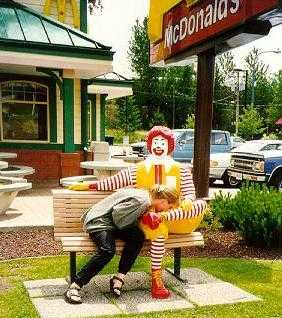

WE won't be certain that Congressman Gary Condit is guilty until Alan
Dershowitz defends him.
But the possibility that Condit wasn't involved in the disappearance
of intern Chandra Levy grows
more remote with each passing day. And not only because of who's already
defending him.
Because you can't turn on the TV without seeing breaking news on the
Levy investigation,
this is like explaining who "John Kennedy Jr." was, but: Levy is the
24-year-old graduate
student from the University of Southern California who had just finished
her internship with
the federal Bureau of Prisons and was about to head back to California
when she vanished
without a trace from her apartment near Dupont Circle on April 30.
The longer Levy remains missing, the more likely it is that she will
not emerge alive.
She didn't fit the profile of a runaway (and runaways tend not to leave
their purses behind).
There is no ransom note.
If Levy has been the victim of foul play, chances are overwhelming,
from a statistical point of view,
that she was the victim of someone she knew. It's been two months and
the police still haven't found a body.
Suicides don't hide the body, random street criminals don't hide the
body, even serial killers tend not to hide
the bodies. Police dogs have searched nearby jogging trails, and Levy's
running shoes were in her apartment.
If she were involved with someone, the possibility that that such person
is involved is even higher.
If she were involved in an adulterous relationship with a married man,
the odds again increase.
If she disappeared during a period when the married man's wife suddenly
came to town, the odds increase further.
Levy was having an affair with Rep. Gary Condit. His wife arrived in
Washington days before Levy disappeared.
Supplementing this mounting suspicion is Condit's practice of acting
guilty. Even as the days grew into weeks
and weeks grew into months with no sign of Levy, Condit kept lying
about the affair. We learned in the Clinton
era that affairs are "private family matters" and "everyone lies about
sex." But this was beginning to look like
a murder investigation.
So it was odd that Condit still engaged in Herculean efforts to conceal
his affair. (He must have thought he was
being pretty smooth, but everyone knew anyway. As a rule of thumb,
whenever a congressman calls an intern
a "good friend," he's having sex with her.) If the affair and Levy's
disappearance are unrelated, why would
Condit persistently lie about the affair?
After issuing preposterous denials for two months, Condit finally did
the honorable thing and owned up to his
relationship with Levy -- right after Levy's aunt went public with
the affair. Condit also lied to Levy's parents
about when he had last spoken with Levy, later giving the Clintonian
explanation that he meant "in person"
as opposed to "on the phone."
Maddeningly, the police are refusing to cough up the details of their
investigation to an inquiring press.
But the FBI was sufficiently interested in Condit to contact his other
mistress soon after Levy disappeared.
The other-other woman, flight attendant Anne Marie Smith, knew nothing
of Levy (for reasons pertaining
to the logic of mistresses). Thus, early in the investigation, something
led investigators to stray beyond
acquaintances of Levy to acquaintances of Condit.
When Smith told Condit that the FBI had called, he promptly attempted
to suborn her perjury.
(Another proven method of looking innocent.) According to Smith, Condit
informed her that she didn't
have to talk to the FBI. He then had his lawyers draft an affidavit
for her denying the affair. Condit, evidently,
does not like mistresses who talk. Smith refused to sign, and took
her story to Fox News Channel.
Condit responded to the subornation charge with more Clintonian dodges.
He swore up and down,
in 17 different ways, that he had told absolutely everyone to tell
the truth ... about Levy's disappearance.
Thus, he "denied" asking Smith to lie about the affair by saying he
had instructed her to tell the truth about
Levy's disappearance (something Smith manifestly knew nothing about).
Condit's attorney on the affidavit later explained that it was only
a draft affidavit and Smith had been
encouraged to edit anything that was incorrect. (Like changing the
part about not having an affair with
Condit to having an affair with Condit.)
But Smith's most intriguing piece of information was that Condit told
her on May 5 or 6:
"I'm going to have to disappear for a while. I think I may be in some
trouble." Levy's parents didn't tell
Condit their daughter was missing until the evening of May 6. If Condit
told Smith he was in trouble
before being informed of Levy's disappearance, he's lying about more
than the affair.
At least there won't be a DNA-stained dress.
Maybe politicians are capable of learning from the mistakes of others.